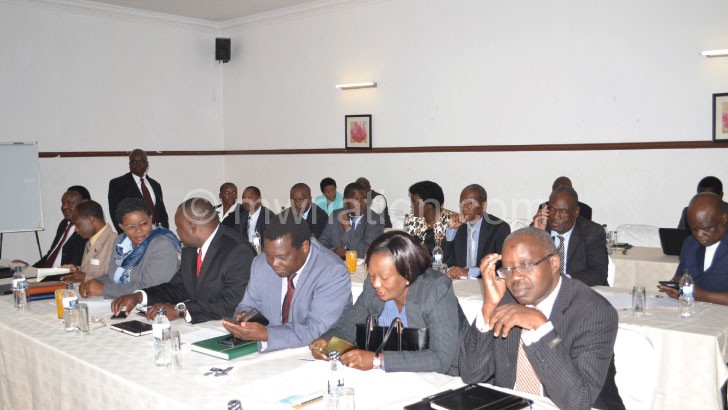Loopholes costing government revenue
Malawi’s key public resource kitty, Account Number One, can easily be three times as full if government seriously traced and accounted for all its funds, a member of Parliament (MP) has observed.
Parliament’s Agriculture Committee chairperson Felix Jumbe, who is also Salima Central MP (Malawi Congress Party-MCP), said in an interview most of the funds are being abused after sales of resources and service charges in ministries, departments and agencies (MDAs).
He was speaking in an interview in Lilongwe as he reflected on some of the major discoveries made during the National Assembly’s national budget cluster meetings held over the past two weeks.
Among other things, cluster committees summoned officials from MDAs and asked them to explain cashflow and expenditure details, especially relating to the 2015/16 National Budget expiring on June 30 this year.

During the interview, Jumbe said in the cluster meetings he chaired, and in observing and analysing proceedings in the other such meetings, he noted that systemic fraudulent practices by crooked officials deprive Account Number One of billions of kwacha every year.
He said: “They [officials] are receiving the money, but there is no mechanism for tracing that money into Account Number One. It all shows that there is no accountability in the Treasury funds that are being collected in the ministries, departments and agencies.”
Jumbe said what may initially appear to be limited revenue from selling odd items such as livestock and fish fingerlings and the issuance of fishing licences, tractor hire or even passport fees and visas eventually amounts to billions of kwacha in the government kitty.
He placed the blame on the weak government audit systems which have been abused by corrupt officials who have channelled the public funds to running personal enterprises.
Said Jumbe: “If the government can be serious in tracing the Treasury funds, those sectors that generate income, Malawi can generate much more income, or revenue, maybe by three-fold. So, those are the insights we are discovering in the cluster meetings and if the government is to take our advice [provided in reports being shared in Parliament this week], I think it can improve a lot on revenue collection.”
He commended the government for introducing the cluster meetings two years ago, pointing out that the new arrangement provides the parliamentarians a more meaningful sector-by-sector examination of the budget.
Ministry of Finance, Economic Planning and Development spokesperson Nations Msowoya yesterday agreed that the government is given a raw deal by some unscrupulous officers on its payroll.
He said: “Whether it is to do with accounting for wood resources at forest reserves, or providing dip tank services in the Veterinary Department or, indeed, road traffic operations, some of the officers get funding from the government. But does all the money they make go back to Account Number One?
“The answer is ‘no!’ And that is where the big problem is. Of course, they issue some government general receipts, but what is channelled back to the government is very little.”
Msowoya said some three years ago, government tried to improve things by empowering the country’s key tax collector Malawi Revenue Authority (MRA) officials to also collect such Treasury funds generated from the public goods and services.
However, he said some officers blocked the proposal because of legality issues.
Msowoya said his ministry has ridden on current public service reforms to challenge the various MDAs to be transparent about internally-generated revenue and it has given targets and incentives to those concerned’
Commenting on the matter, Malawi Economic Justice Network (Mejn) executive director Dalitso Kubalasa said on Tuesday that his organisation is very concerned about these very revenue leakages in the government.
He said Mejn is compiling a consolidated analysis of the budget, highlighting how systems need to promote prudence and efficiency.
“We need to be serious, for these are really serious leakages,” he said.
In recent years, Malawi has come under fire for poor public finance management systems, a development that has drained public resources through fraud.
The shooting of former Ministry of Finance budget director Paul Mphwiyo outside the gate of his Area 43 house in Lilongwe on September 13 2013 led to revelations of the plunder of public resources at Capital Hill later called Cashgate.
Following the exposure, former president Joyce Banda ordered an audit which British forensic audit firm Baker Tilly undertook covering the six-month period between April and September 2013.
The audit established that about K24 billion was siphoned from public coffers through dubious payments, inflated invoices and goods or services never rendered.
In May 2015, a financial analysis report by audit and business advisory firm PricewaterhouseCoopers (PwC) also established that about K577 billion in public funds could not be reconciled between 2009 and December 31 2014. n





